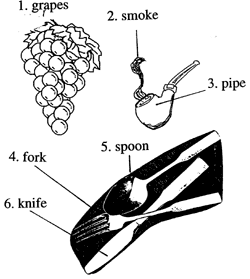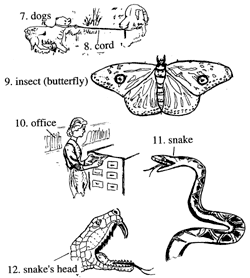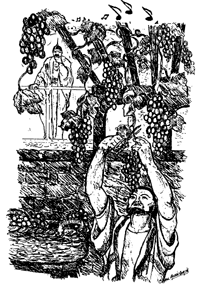Unit 26: Questions
Pictured Words
New Words

| 1. grapes
|
| 2. smoke
|
| 3. pipe
|
| 4. fork
|
| 5. spoon
|
| 6. knife
|

| 7. dogs
|
| 8. cord
|
| 9. insect (butterfly)
|
| 10. office
|
| 11. snake
|
| 12. snake's head
|
Nouns
Adjectives
Sayings
Are these potatoes for sale?
Is there a snake in this garden?
Is it possible to see any smoke at that distance?
Is a butterfly an insect?
What is that dog hanging on to you for?
When should one keep out of the office?
Why have I to make a request to see your office?
Why are there insects in those potatoes?
Who is able to take his food with a spoon, or must you have a knife and fork ?
Which dogs are not able to go on the road?
How will we go to the hospital?
Questions
When it is your desire to get information you may put a question to your hearer by means of a simple change of word order.
You make an exchange between the order of the operator and its subject in the statement and so turn it into a question:
| Statement
| Question
|
| We are waiting for another.
| Are we waiting for another?
|
| This is not the son of Joseph.
| Is not this the son of Joseph?
|
| It is right to do good on the sabbath not to do evil.
| Is it right to do good on the sabbath or to do evil?
|
| It is possible for one blind man to be guide to another.
| Is it possible for one blind man to be guide to another?
|
There are other ways of putting a question, of course.
You may use the helpers "who, which, what, why, when and will"
who
who is this, who has no respect for God?
who is my neighbour?
who then will be the owner of all the things
which
which you have got together?
which of these three men was neighbour to the man?
which of you will give a stone to his son for bread?
for which of those works are you stoning me?
what
what is your name?
what are they like?
what profit will a man have if he gets all the world, but undergoes loss or destruction himself?
why
why do you take note of the grain of dust in your brother's eye?
why are you turned away from me?
why are you troubled in me?
when
when will these things be?
when did we see you in need of food?
when did we see you wandering?
will
will you give us teaching about prayer?
will you give him a snake?
will you take your rest among the flocks?
It seems a fair statement, however, that these are only words which indicate a question is to be put.
They do the same thing as in the first form of question by changing the order of the operator and its subject.
But they let it be known that a question is coming.
Another word that does that is "how"
how
how then will he keep his kingdom?
how may we give food to such a number of people?
how long will I put up with you?

Naboth's Vine-Garden
Now Naboth the Jezreelite had a vine-garden in Jezreel, near the house of Ahab, King of Samaria.
And Ahab said to Naboth, give me your vine-garden so that I may have it for a garden of sweet plants, for it is near my house;
and let me give you a better vine-garden in exchange, or, if it seems good to you, let me give you its value in money.
But Naboth said to Ahab, By the Lord, far be it from me to give you the heritage of my fathers.
So Ahab came into his house bitter and angry because Naboth the Jezreelite had said to him, I will not give you the heritage of my fathers.
And stretching himself on the bed with his face turned away he would take no food.
But Jezebel, his wife, came to him and said, Why is your spirit so bitter that you have no desire for food?
And he said to her, Because I was talking to Naboth the Jezreelite, and I said to him, Let me have your vine-garden for a price, or, if it is pleasing to you, I will give you another vine
Then Jezebel, his wife, said, Are you now the ruler of Israel?
get up, take food, and let your heart be glad;
I will give you the vine-garden of Naboth the Jezreelite.
So she sent a letter in Ahab's name, stamped with his stamp, to the responsible men and the chiefs who were in authority with Naboth.
And in the letter she said, Let a time of public sorrow be fixed, and put Naboth at the head of the people;
and get two good-for-nothing persons to come before him and give witness that he has been cursing God and the king.
Then take him out and have him stoned to death.
So the responsible men and the chiefs who were in authority in his town, did as Jezebel had said in the letter she sent them.
They gave orders for a day of public sorrow, and put Naboth at the head of the people.
And the two good-for-nothing persons came in and took their seats before him and gave witness against Naboth, in front of the people, saying, Naboth has been cursing God and the king.
Then they took him outside the town and had him stoned to death.
And they sent word to Jezebel, saying, Naboth has been stoned and is dead.
Then Jezebel, hearing that Naboth had been stoned and was dead, said to Ahab, Get up and take as your heritage the vine-garden of Naboth the Jezreelite, which he would not give you for money, for Naboth is no longe
Additional Reading
It seems to us to be a normal thing for a king to want to get his grip on the land which was near to his house.
This meant that the persons who did the work in his gardens would be able to come and go readily.
And they would be able to take with them the plants and fruits which they took from there.
It was a good system.
That is why King Ahab had such a strong desire to get Naboth's vine-garden to make it a place where he could have his sweet plants.
But persons who have farms seem to become a part of the land from which they make a living.
The longer they are there the more this is true.
In the story of Naboth this is the thought which is given us in the words, "the heritage of my fathers".
In those times it was a wrong thing for anyone to give away the land that had come down to him from his fathers.
So, it was quite right that Naboth would not give his land to King Ahab, even in exchange for payment.
It would seem only right that Naboth might be given a good reward for his act.
But, Ahab's wife, Jezebel, was cruel and clever.
She saw to it that a bad reward was given to Naboth.
She had him put to death by getting all persons in that place to send stones raining down upon him.
We say he was "stoned".
She did this because she had a desire to get hold of Naboth's vine-garden.
In those days it was a normal process of government to let everyone in the place make a decision between good and bad.
They did this by making use of two special judging stones which they kept for that purpose.
It was a decision that was made by rules of chance.
If the chance was against you, the word of two persons was enough to say you had done wrong and should be given the punishment of stoning by every person present until you were dead.
It seems to us now to be a very wrong way of making a judgement.
But it was often done that way in Israel.
To make things even more serious, the sons of the person in the wrong were also put to death.
They would then not be around to give their opinion that a false judgement had been made.
So, it was quite a false action by Jezebel to get control of Naboth's vine-garden.
It was also one that did her no good.
The story goes on to say that a wise and religious man called a prophet said she would come to a bad end.
He said her blood would become food for dogs just as had happened with the blood of Naboth.
His saying was quite true.
She was put to death by being made to fall from a high window.
When she was down on the earth, dogs came and made a meal of her.
They left only her hands and her feet.
This was a sad end for a powerful queen.
Helpful Notes
| vine-garden
| a garden for growing grapes.
|
| Jezreel
| a place in Samaria.
|
| Samaria
| Northern Palestine.
|
| no desire for food
| no wish to eat.
|
| good-for-nothing persons
| bad type of persons.
|
| stoned to death
| sending stones straight at a person till their end.
|
| cursing God and the king
| saying things against, so worthy of death.
|
| a part of the land
| a sense of connection with the land.
|
| exchange for payment
| pay money when received.
|
| special judging stones
| these were given by Moses.
|
| rules of chance
| it was thought the stones judged rightly.
|
Interesting Facts And Records
Vine-Gardens And Plants
The gardeners of early times were quite skillful at discovering plants which gave good rewards for their work.
It was a skilled process to make into one unit a good sort of plant with a wild one.
This was often done to the olive tree.
It lived for a long time, even hundreds of years.
It gave fruit to eat and oil to use in cooking and lighting.
As it says in Scripture: "By its fruits you will get knowledge of the tree".
Vine-gardens were very important in early times.
Gardeners gave them every attention.
There were many sorts too.
The first plants were discovered in Central Asia.
From there they were distributed East and West.
The rulers of China got their knowledge of the vine when on war in Asia.
Its fruits are the grape.
They took special care of the young plants, to give them freedom from insect attack and so get good growth in the summer.
The office of vine-grower was an important one for the government.
It was also an important office in Israel.
The tendency to make wine from grapes was very strong.
A vine-garden was the cause of the trouble between Naboth and Ahab.
The vine was grown a lot in Egypt too.
Pictures of grapes and wine-making may be seen on the walls there.
The grape vine was also a national sign in Israel.
There were many other plants that were highly valued.
Barley and wheat were chief among these.
Beer was made from barley.
Bread was made from both grains.
A kind of thick soup was made from barley with goat's meat cooked in it.
The person taking the meal had the bread in his fingers to take the meat from the soup for eating.
He did not use a spoon.
The seed with the name, "mustard", was very small.
It grew into a small tree in which little birds were safe from their enemies.
It is given as a picture of the Kingdom of Heaven amongst men.
In those early days there were no potatoes, nor was there any sugar.
A bean tree had nuts that gave sugars.
Bees were also kept for that purpose.
There was no tobacco from which to get pleasure by smoking.
The land had many trees growing in early times.
Some of these were of great value for building.
"Cedar" was a tree that was ahead of all others for this purpose.
It was a big tree with sweet perfumed wood.
It grew in the high mountains and King Solomon went to special lengths to get trees for the building of his fine church, which now has the name "The Temple".
There was also much use made of grass for feeding animals.
Many sorts of plants had the name grass.
Any plant which animals took for food or that grew in the green field was a grass.